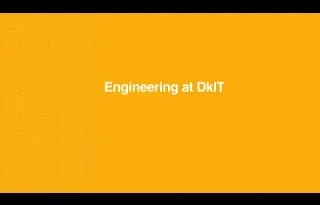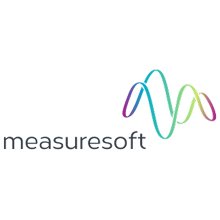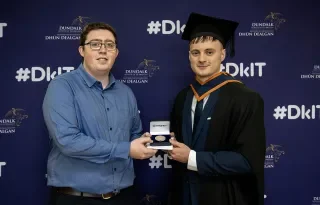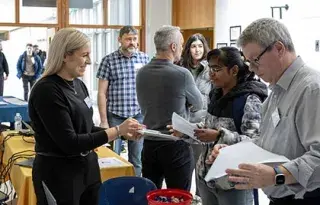BEng (Hons) in Electrical and Electronic Engineering

Search to find a different course
Course Overview
Electronics is in every aspect of our society, electricity is the path to a decarbonised future. This course equips students with both theoretical knowledge and practical skills in the engineering sector to engage with the future communications and grid challenges. The course covers electrical and electronic engineering, control and automation, renewable energy technologies, and the design of smart connected ‘things’ based on microcontrollers, through hands-on projects, industry placements, and research. With a focus on innovation, problem-solving, and sustainability, students learn to develop high-quality electrical and electronic systems and products. The course educates students to the level of design engineers, emphasising analysis and computation as core components of the skillset. Graduates are equipped to innovate and excel in a dynamic and evolving engineering landscape.
What makes this course different
Work Placement
Students will undertake a minimum 6-month industry work placement where they gain important contacts within the industry to help them in their future careers. Many of our graduates go back to those companies on completion of their degrees. Employers include; ControlSoft, Premium Power, Irish Rail, Microchip, Suir Engineering, Kirby Group, Glen Dimplex, ABB, Panasonic Avionics, Kingspan and others. These placements are paid by employers and are of huge benefit to the students.
Graduate Employability
There is a dedicated Engineering careers fair at DkIT each year with over 30 companies seeking graduates. Graduates are very well received by local industry, with most Year 4 students securing employment before the end of their studies. In combination with our revised placements our students are in demand on completion, and can even apply for industry funded student bursaries during their programme.
Excellent Graduate Opportunities
100% of graduates are in employment within 6 months after graduating. 100% of graduates also reported that this degree was essential for their job roles. (DkIT/HEA Graduate Survey)
Understanding the Industry
Electrical and Electronic Engineers have a high level of analytical and engineering design skills, and work in exciting engineering fields; renewable energy, product design, telecommunications, manufacturing, food processing, pharmaceuticals, automation, control, building services and petrochemicals. Whether working on smartphone circuit boards or hooking renewable energy sources to homes, electrical and electronic engineering is an exciting and ever-evolving field.
Career Opportunities
A sample of our graduate destinations include: ABB, Agilent Technologies, Amazon Web Services, Anord Mardix, Analog Devices, Blueacre Technology, CombiLift, ControlSoft Automation, ESB International, Electricity Supply Board, Facebook, Glen Dimplex Renewables, Hanley Energy, Hewlett Packard, Intel, Mercury Engineering, Nikon Precision Europe, NXP Semiconductors, Realtime Technologies, Sepco Arabia CO, Valeo Vision Systems and Vanderlande.
Future Careers:
- Electrical engineer
- Electronics engineer
- Control and Automation engineer
- Embedded Systems engineer
- Power Systems engineer
- Product Design engineer
- Field engineer
In these areas:
- Research
- Product design
- Manufacturing
- Automation
- Renewable energies
- Power Generation, storage and distribution
- Project planning
Graduates work at

Course Delivery and Modules
The course is delivered via lectures, tutorials and practical lab classes. There are on average of 24 contact hours per week of which 60% is practical based, with the remaining 40% consisting of classroom lectures.
These modules relate to 2025-26 academic year only.
Semester 1
- Engineering Professional Practice
- Engineering Science
- Materials Science
- Computing for Engineering
- Statics
- Engineering Mathematics 1
Semester 2
- Engineering CAD
- Dynamics
- Electrical and Electronic Principles
- Engineering Mathematics 2
- Engineering Professional Practice
Semester 1
- Analogue Electronics
- Electrical Engineering
- Mathematics - Circuit analysis
- Microcontroller systems
- Sensors
- Signal Conditioning
Semester 2
- Computerised Instrumentation
- Digital Electronics
- Electrical Machines
- Group Microcontroller and networking project
- Mathematics - Signals & Systems
- Microcontroller Architecture
Semester 1
- Communications 1
- Applied Control Engineering
- Electrical Engineering
- Electrical Machines
- Electronic Product Development
- Embedded Systems Design
Semester 2
- Industry Career Placement
- Mathematics: Discrete time signals and systems
- Product Development engineering
Semester 1
- Communications 1
- Control Systems Engineering
- Embedded Systems Design
- Final Year project 1: research and design
- Power Electronics Design
- Power System Engineering
Semester 2
- Advanced embedded systems:Communications and RTOS
- Communications 2
- Final Year Project 2: Implementation and evaluation
- Industrial networks, protocols and applications
- Innovation Management
- Power Grid Systems
Work placement
In Year 3 students undertake a minimum 13-week industry work placement where they gain important contacts within the industry to help them in their future careers.
Education Progression
MSc in Renewable Energy Systems
Fees and Funding
Please find information on fees and funding here.
Entry requirements
In addition to the standard entry requirements below, Maths Grade H6 or O2 is also required for Leaving Certificate or QQI applicants. A Merit in QQI Maths for STEM NFQ (5N0556) will also meet this specific Mathematics entry requirement.
Applicants from NI/UK require a GCSE Maths Grade 8/A or AS Level Grade C or A Level Grade D.
- Standard Requirements for Leaving Certificate Applicants
- Standard Requirements for UK/NI Applicants
- Standard Requirements for QQI-Further Education Applicants
Additional Maths Entry Exam at DkIT:
If you have not met the maths entry requirements for this course (but you have met the basic maths entry requirement for a level 8 course at DkIT), you have a second chance at meeting these additional Maths Entry Requirements by sitting the DkIT additional Maths Entry Examination, held in August of each year. More details about the maths entry exam.
Recent CAO points
How to apply
Apply on CAO
All standard entry first-year applicants must apply for entry through the CAO. See Important application dates for CAO and information for specific applicant types below:
Advanced Entry & Transfer Applications
Advanced Entry is for applicants who have previous educational achievements and/or work experience and want to be considered for direct entry into year 2, 3, or 4 of a course. This includes students looking to transfer to DkIT from another Higher Education provider.
International Application (non-EU)
International Applicants (not from or living in the EU) can apply through an agent or directly to DkIT to study this course.
Ask us a Question
If you have a question about the BEng (Hons) in Electrical and Electronic Engineering please ask it below and we will get back to you.
Disclaimer: All module titles are subject to change and for indicative purposes only. All courses are delivered subject to demand and timetables are subject to change. Elective Module options will only run subject to student numbers. The relevant Department will determine the viability of each elective module option proceeding depending on the number of students who choose that option. Students will be offered alternative elective modules on their programme should their preferred elective option not be proceeding. Award Options for Common Entry Programmes: The relevant Department will determine the viability of each award option proceeding depending on the number of students who choose either option. If the numbers for one of the Award options exceed available places, students for this option will be selected based on Academic Merit (highest grades).




